Weebly and GoDaddy are two of the most well-known brands in the website-building industry. I’ve covered each form in detail in my Weebly Review and GoDaddy Website Builder Review, but how do these competitors stack up against one another?
| Takeaways | GoDaddy | Weebly |
|---|---|---|
| Key Strength | Ease of Setup & Pricing | Versatile features |
| Key Complaint | Limitations on functionality | Managing lots of pages |
| Best for | Simple websites | DIYers & small shops |
| Current Promotion | Start For Free | Get Weebly For Free |
How Website Builders Work
The process of building a website has changed radically since the early days of the Internet. Even though the core job of a website – HTML rendered in a browser – has not changed, the technology used to produce the HTML has. While you can still produce a website with nothing but a text editor – technology has made the process much easier and more accessible.
Nowhere is that more true than with all-inclusive website builders, which both GoDaddy and Weebly offer. Website builders employ a drag-and-drop functionality which means that you don’t need any coding skills to build your own website.
Website builders come in many different forms. Some give more control to the user but require a steeper learning curve. Other website builders, like Weebly and GoDaddy’s Website Builder, do the heavy lifting but at the expense of customization. In other words, there are tradeoffs. I’ve written a full explainer on website builders here.
Website Builders vs. WordPress
Weebly and GoDaddy’s Website Builder offer more convenience by bundling your web hosting service, domain names, SSL certificate, design, content management system, etc., to a single subscription.
These all-in-one platforms compete with options like WordPress (which provides free software to build a website that you own & control on your own hosting service – see my WordPress setup guide here) and typing actual HTML code into a text file.
Note that GoDaddy is also a hosting provider where you can install WordPress. But this comparison will focus on GoDaddy’s Website Builder, which bundles a hosting plan. You can find GoDaddy hosting alternatives here.
Clear as mud? : ) Let’s dive into our comparison, which includes pricing, onboarding/user experience, design features, technical features, marketing features, customer support & company structure.
Pricing
Comparing pricing between GoDaddy Website Builder and Weebly is tough because their tiers are completely different. Weebly tiers are based on technical and eCommerce features. GoDaddy bases its tiers on service upgrades.
Weebly
| Plan | Personal | Professional | Performance |
|---|---|---|---|
| Price | $9.00/mo. | $16.00/mo. | $29.00/mo. |
| Yearly Price (discount) | $7.00/mo. | $15.00/mo. | $30.00/mo. |
| Storage | unlimited | unlimited | unlimited |
| Visitors/month | unmetered | unmetered | unmetered |
| Email Accounts | - | - | - |
| Dedicated Domain | |||
| Free Domain Name | - | 1 year | 1 year |
| Free SSL | |||
| Display Ads | |||
| Analytics |
GoDaddy Website Builder
| Plan | Basic | Standard | Premium | Commerce |
|---|---|---|---|---|
| Price | $6.99/mo. | $10.49/mo. | $13.99/mo. | $17.49/mo. |
| Storage | unlimited | unlimited | unlimited | unlimited |
| Visitors/month | unmetered | unmetered | unmetered | unmetered |
| Email Accounts | unlimited | unlimited | unlimited | unlimited |
| Dedicated Domain | ||||
| Free Domain Name | - | - | - | - |
| Free SSL | ||||
| Display Ads | ||||
| Analytics |
Weebly offers the most feature value and fewest real caps at each tier. Weebly’s cheapest plan is ideal for a personal or small business website. GoDaddy’s Website Builder is only competitive on price, depending on the use case.
Even though Weebly wins on overall value, both are competitive enough that you should compare their other feature instead of deciding based on price.
I should point out that website builder prices are higher than building your own site with WordPress on a dedicated web host, like Bluehost or HostGator.
Winner: Weebly
Onboarding & User Experience
The best website builder platforms prioritize user experience and have a smooth onboarding process. It is how companies move you from being a new customer to an active customer. And since website builders have a bundled product – they should have a huge advantage on this point.
Overall, Weebly wins – given how many features they have. But on a measure of how quickly you get from your first click to a live website – GoDaddy wins, with a caveat.
Weebly starts strong by allowing you to immediately segment yourself by type of website (i.e., “restaurant” or “real estate,” etc.). They also offer unintrusive info buttons, pop-ups, a checklist, and an email sequence.
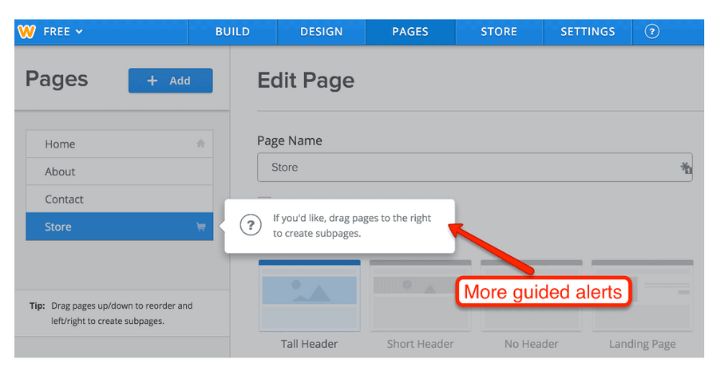
GoDaddy’s website builder is faster from start to finish. But that’s because they offer fewer features, templates, and other options than Weebly. Also, many people have their custom domain registered in a GoDaddy account, and that integration is really convenient when setting up a website.
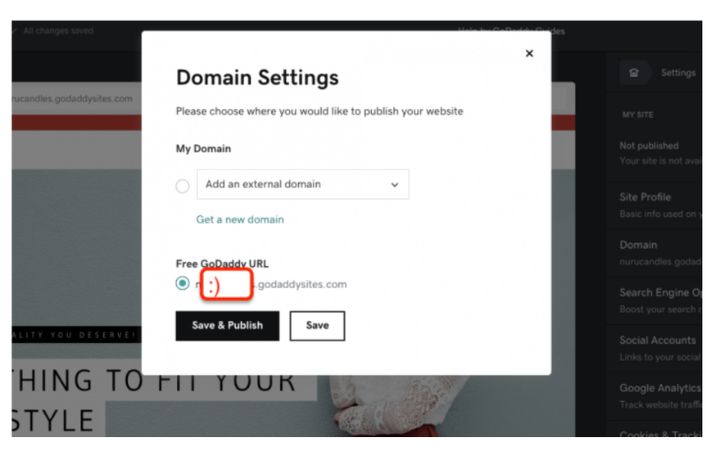
That’s not a good or bad thing – it all depends on what you’re looking for. But GoDaddy’s setup is much more akin to setting up a Facebook or Twitter profile than designing a website.
Winner: Weebly
Design Features
Much of a website builder’s advantage lies in its designs.
Design is hard. And it matters – a lot. Many people can spot a good-looking website but have a harder time figuring out how to get there. Using a template for a foundation and then customizing it is a good way to get the site you want without paying for a custom design.
As I mentioned in the onboarding section, GoDaddy not only has plenty of templates, they do an excellent job of pre-filling the templates with solid imagery.
On the flip side – GoDaddy has very limited actual design options.
They do not have drag and drop. You can add “sections,” but the color, typography, and layouts are pretty set. Their templates are fine but certainly not groundbreaking or beautiful.
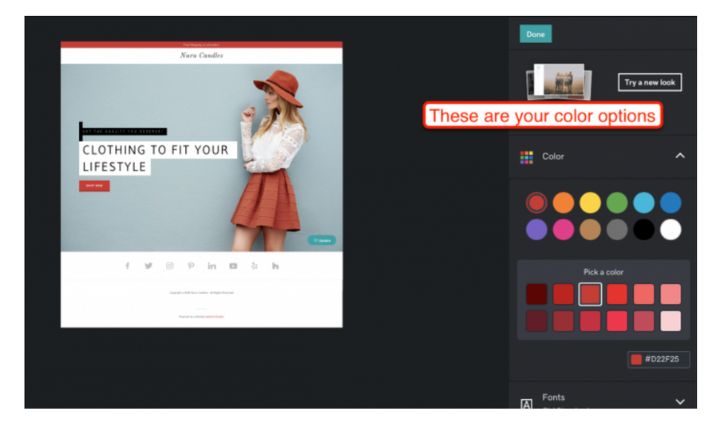
Weebly has a broader range of templates. But even as a non-designer, I can tell they are more functional than beautiful.
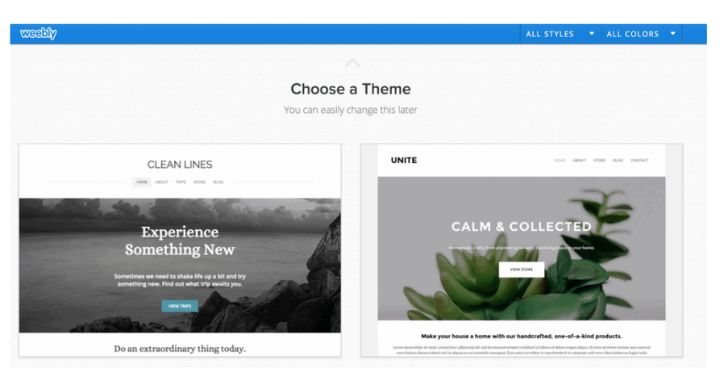
Overall Weebly does better on design. Both have solid templates and allow for customization if that’s your thing. I like the fact that Weebly allows CSS customization. If you want to deliberately limit yourself to a pre-filled template that does the job – then GoDaddy’s route is certainly an option; otherwise, Weebly is the better option.
Winner: Weebly
Technical Features
Technical features don’t matter…until they do. I’m talking about generating clean URLs, editable metadata, allowing page-level redirects, etc.
Weebly has plenty of front-end tools. They automatically generate permalinks and well-coded HTML. You can edit CSS & HTML if you want. My professional opinion? For a hosted website builder, they do very well.
GoDaddy makes sites that work…but are very limited from a technical perspective.
With GoDaddy – what you see is what you get. It creates clean URLs and renderable HTML. It is not suitable for a long-term project where you will want to upgrade and add features.
Website builders are limited on technical features by their nature, but Weebly does surprisingly well.
Winner: Weebly
Marketing Features
In the movie Field of Dreams, Kevin Costner’s character famously says, “if you build it, they will come.” Sadly, that is not true about websites. Just like any business, you have to actively promote and market your website for anyone to show up.
Marketing features like custom metadata, open graph information, Schema markups, email signups, share buttons, landing pages, social media integration, etc, all make marketing your site much easier.
Weebly has plenty of plugin/app options, built-in marketing features (like SEO editor), and the ability to place custom Javascript anywhere, which opens many opportunities for custom tools (like OptinMonster) to retarget and conversion rate codes.
With GoDaddy, what you see is what you get. It’s simple but very limited. In fact, GoDaddy uses some marketing features as an upsell while thoroughly miseducating its customers. Here’s an example of how they do this with “SEO” – you can read the full context in my GoDaddy Website Builder Review, but basically, they create a non-issue with SEO and then sell the “solution.”
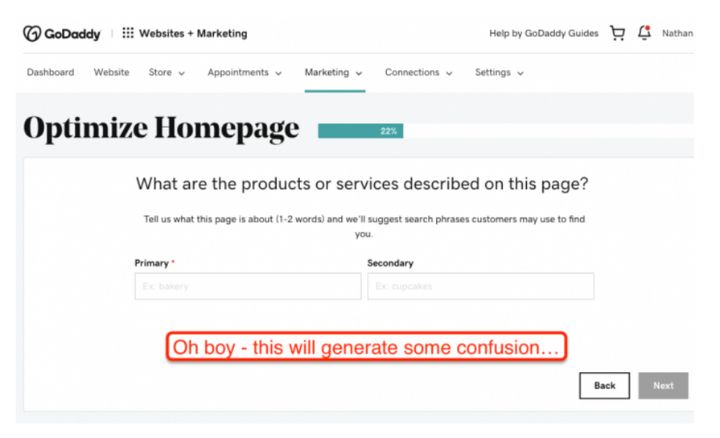
The issues here are that first, while all too common – the idea of “ranking higher” is misleading. Second, they put way too much emphasis on things like title tag formatting that sort of matter but do not matter nearly as much as having a good keyword map with good content that targets an achievable theme of keywords.
Or – things like creating an effective marketing strategy. If you simply need an online presence, both will work. I’d prefer to work with a Weebly website.
Winner: Weebly
Support & Service
Both Weebly and GoDaddy do phone support during business hours, in addition to email tickets and customer forums.
Since they both run on proprietary platforms, it’s usually easy to find a solution (i.e., they built the software, so they can fix it). They both have their share of customer horror and success stories around the Internet. While I’ve never had a bad experience with either platform, drawing conclusions based solely on customer reviews is unfair.
Both offer good support channels, but they also view customer support both as an investment and as an opportunity to upsell. GoDaddy offers phone and the most direct options. But either way, be sure to be direct and forthright about your problem and watch for upsells. But there’s no real advantage/disadvantage when it comes to support.
Company Structure
I’ve been using web services for years now. And while features & marketing materials change frequently, I’ve found it helpful to understand a company’s structure to get an idea of where they are going. Here’s how each company is structured and what that means for you over the next few years.
Weebly is a private company that was purchased by Square, a publicly owned payments company. The upside as a subsidiary is that customers can expect a lot of useful & cheap integrations. If you use Square or might use Square, then you should give extra points to Weebly. Additionally, Weebly’s product could get subsidized by Square as they add features to the whole product suite.
The risk for Weebly customers, though, is that Square only cares about Weebly as much as Weebly makes Square money. If Weebly doesn’t make money for Square, it could languish in neglect (see Blogger & Google).
GoDaddy is also a publicly-traded company. But unlike Weebly, their website builder is only one of a whole suite of products. The upside is that GoDaddy customers benefit from a whole slew of integrations and cross-subsidies. You get all the benefits of their scale. The risk is that GoDaddy changes the product, starts requiring integrations, or just neglects the product. I don’t see that happening because their website builder complements their other products, but you never know.
Weebly & GoDaddy Comparison Conclusion
Winner: Weebly
My overall winner, by a significant margin, is Weebly. And perhaps it should come as no surprise. After all, their website builder is their flagship product, it’s the essence of the company. GoDaddy Website Builder is a complementary product, one of many different services they offer.
GoDaddy Website Builder is a good fit for anyone who is already using GoDaddy for their domain services. And it gets the job done if you want something simple and straightforward. Get GoDaddy’s promo here.
Otherwise, Weebly is the best fit for anyone who wants a solid overall website builder at a competitive price. Get Weebly’s free trial here.
If you’re interested in building your own website with your own web host (including on GoDaddy WordPress Hosting), check out my step-by-step tutorial here.



